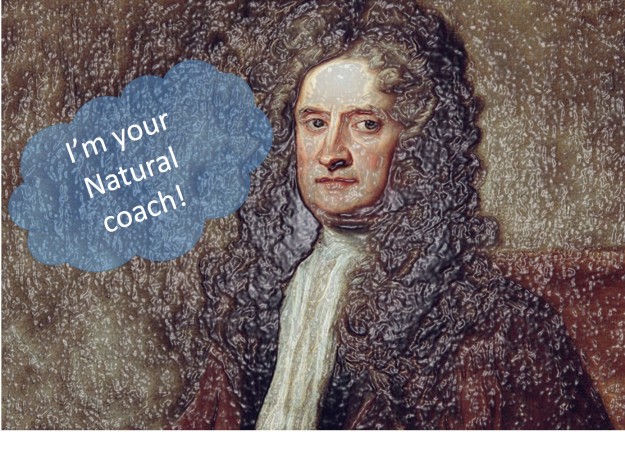
“The only good is knowledge, the only evil is ignorance.” ~ Socrates.
Much — if not all — suffering is caused by ignorance: we don’t know how the world around us works, we often can’t even establish personal and other types of relationships with people, because that, too, is based on certain knowledge (and experience). We first commit errors and then get unhappy as we can’t reach our goals or won’t find stable sources of happiness and satisfaction around us. This is why we desire knowledge, and that is good! We need it to get better, to upgrade our perception, attitude and behavior, to make things smoother and more fulfilling.
Meet your natural coach, Isaac Newton, and his three laws of motion (movement). It is important to learn about the ways or laws of the universe to act or sow properly and reap accordingly. What do Newton’s Three Laws teach us? How can we apply these for our advancement and fulfillment?
1. An object either remains at rest or continues to move at a constant velocity (speed), unless acted upon by a force.
So, nothing changes unless “force” is enacted. What Newton is saying to you is you need to act if you want to change something. If you perform and behave the way you always do, you will continue to either stay where you are (maybe you’re broke or unhappy about something) or you’ll continue rolling into / toward something you don’t want (a career you don’t like, a relationship you don’t want, a lifestyle you know slowly kills you).
I’m wishing on a star, but I continue living the way I did yesterday or a month ago. Yes, with our thoughts we make the world as Buddha puts it (or as he is quoted saying). But in most cases we confine the power of thought by making the distinction between our heads and the “rest” of the world. And in practice it is our behavior, our actions that create our reality, and there exists this gap between what we think and between what we do.
Be the force or bring some force into your life to change the way things are if you’re unhappy about what is now.
2. “The acceleration of an object is dependent upon two variables — the net force acting upon the object and the mass of the object.”
[This definition comes from physicsclassroom.com]
The second and third laws relate to the first one. This second law simply states that how the external force (the one we speak about in the first law) will change your life depends on two factors: (1) what kind of force it is (how it behaves, where it comes from, how fast it travels etc), and what is your situation like (how serious / bad / good things are)?
If you suffer from depression, for example, and you hope that it will be gone if you simply watch a video on Youtube, then the force (the vid) is not proportional to the mass of the object (your depression), meaning your depression is far bigger than the vid, it has been accumulating for months or years, and hoping to relieve it by a movie or a vid is simply unrealistic. It’s like trying to cause a truck move by throwing a brick on it. It won’t move, right? (but the driver will…)
Will one MOOC (Massive Open Online Course) help you with getting a new career and specialization? Sometimes it may, sometimes it may not. No one can give you a ready-made answer.
The force that should change your life needs to be proportional to your condition / problem.
3. “For every action, there is an equal and opposite reaction.”
“When you run up a hill, the hill also runs you up it.” ~ Alan Watts
Flowers, leaves and fruits can stem from one branch. Same energy, different ways of manifestation.

Flowers, leaves and fruits can stem from one branch. Same energy, different ways of manifestation
How to Become Happier?
I. Move from ignorance to light / knowledge, that is LEARN,
II. Think and act in accordance with the knowledge accumulated, with natural laws.
The most important foundation is to know that everything is interrelated and conditional (there is no separate self that is not affected by the rest of life). Then you have these three laws we’ve covered, physics (which literally means “nature”) and science, religious/philosophical texts and, most importantly, your own experience.
http://www.higherperspectives.com/what-do-newtons-laws-1723044054.html?xrs=RebelMouse_fb